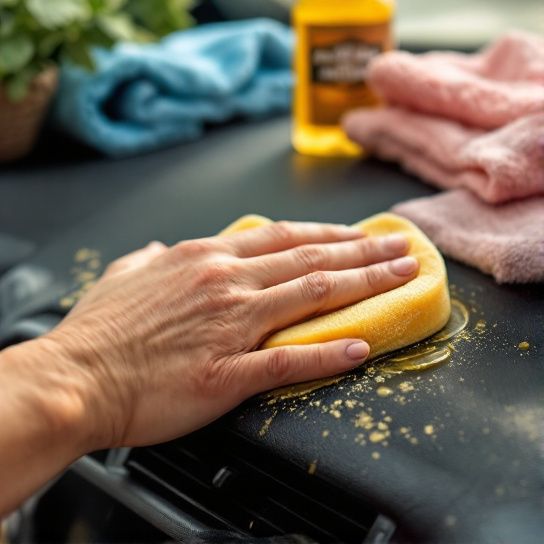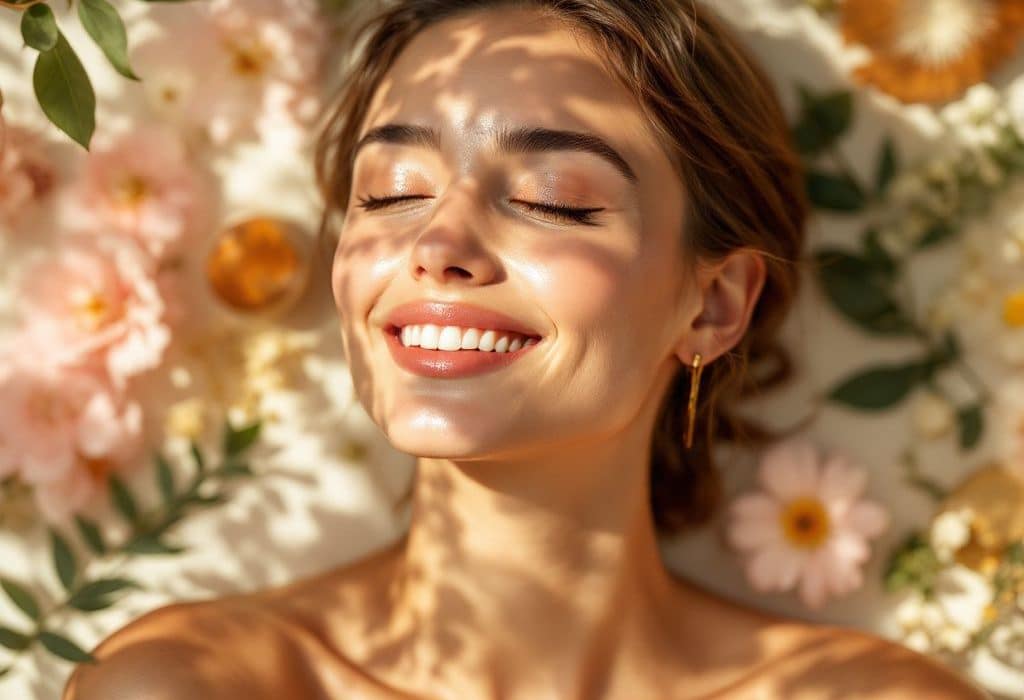Picture this: you’re standing in front of the bathroom mirror, shelves crammed with numerous beauty products, each promising miraculous transformations. Yet, somehow, your skin still feels lackluster, lacking that radiant glow you constantly hear about. Ever feel like the more products you use, the more your skin revolts? Trust me, you’re not alone in this beauty conundrum.
At the heart of beauty lies simplicity—a truth often buried under layers of products. But what if tuning into your inner voice, rather than muffling it, was the secret to glowing, empowered skin? Intuitive beauty care is about exactly that. It’s a practice that blends listening to your internal signals with the thoughtful use of products, all while embracing a holistic approach.
Intuitive Beauty Care: The Essence of Listening to Your Skin
So, what exactly is intuitive beauty care? It boils down to one simple concept: let your skin speak, and actually listen. Instead of rigidly following routines outlined by beauty influencers or board-certified experts (who, let’s admit, don’t know your specific skin quirks), you veer towards a more instinctual approach. This means stepping back from trends and focusing on how your skin responds to different elements.
When your skin cries out for moisture, hydrate it. Feel like a steam facial would work wonders? Go ahead and indulge in one. It’s about leaning into those moments, recognizing the language of your skin and giving it what it naturally needs.
Rethinking Natural Beauty Products for Personalized Care

Natural beauty products form a cornerstone of intuitive beauty care. Think of them as tools—authentic, gentle solutions shaped to nurture your skin rather than cover it up. By choosing natural ingredients over complex synthetics, you embrace products closer to their source, with fewer risks of irritation.
Sounds straightforward, right? Yet, it’s an art to balance, requiring both awareness and patience. Understand that what works for one’s glowing cheeks might not suit self-imposed stubborn acne on another. Give this a try: see products not as solutions but as accompaniments in your beauty journey.
Key Steps in Embracing Intuitive Beauty Care
Ready to make that leap to intuitive beauty care? It might seem a little overwhelming, but fret not—it’s simpler than it sounds. Let’s break it down into gentler, actionable steps:
- Pause and Reflect: Begin here by hitting the pause button once in a while. Your skin speaks before it acts up. Is it simply bored with your current regime? Maybe it’s asking for more—maybe less. Reflect on what you observe throughout the week, looking for patterns or triggers.
- Start Small: You don’t have to overhaul your skincare overnight, draining your wallet like it’s Black Friday gone viral. Definitely, give a gentle cleanser or a cold-pressed oil a try first. Small inclusions, over time, offer clarity on what works and twirls your skin dance.
- Conscious Ingredient Check: Know “who” lives in that beauty bottle. Turn that label around and become friends with it. The closer it sounds to an ingredient in your kitchen cabinet, often—not always—but often, the better. Look for ingredients like aloe vera, honey, rosehip, and chamomile oil.
- Listen Daily: Make daily rounds checking in with your skin; a tad of patience does wonders. Notice its behavior—try how it reacts to changed environments, or shifted dietary choices, it’s all connected, ever so rarely, within a vacuum.
- 5. **Relax with Routine Adapting: Find a rhythm, but mold it when life gets a curveball. Maybe you’ve discovered your skin drinks way too much moisturizer or has developed a bee-like attraction to clay facial masks. Align your routine in symmetry with life, being flexible and honest about your time, temperature, or skincare fascination phases.
- 6. **Embrace Vulnerability: Let go. Realize that sometimes skin reflects more extensive stories—be it stress or lack of sleep from a traveler whose Instagram stories are silent joys. It’s about comfort, not perfection.
- 7. **Community Engagement: No, it’s not contradictory; we ain’t preaching isolation here. Engage, learn, but adopt with care, guidelines—a conversation turns enlightening when shared. This is where skincare communities echo profoundly, sharing experiences or maybe some DIY concoction treasure trove you’ve yet to explore. Trust these reviews not to mimic but inspire what’s good in them.
Understanding Environmental and Internal Influences

Remember, beauty isn’t skin deep. Our environment—pollution, weather changes, stress—and what we nourish ourselves with plays substantial roles. Inner wisdom connects mental peace interwoven with body health more profoundly than any arduous calendar plan marks.

Include laughter and learning new during trials, errors in unexpected places too. Sometimes it means sailing coffee-free Mondays or taking morning sun-sessions. Feel life, lead intuitively through actions set forth by observation.
A Journey, Not Destination
Intuitive care is a path. Equipped with awareness of natural beauty products and clarity from internal signals, beauty finds a voice unrestrained. Relinquish control sometimes to liberate that natural glow craving visibility.
Natural components harmonize choices uniting skincare tales untold, like sous cheffing wisdom—consisted joystone living symphony for both directed and agreed experiences.
Stressed evenings and hamster-wheeled schedules don’t dim glow: luminous thrives kindness—dance untangled either less powders aplomb handience sharing muses excelling repetitions cride intuition—it will teach elate vibrant joy crispy mornings deservedly cherish. Who could resist such charisma? Go ahead, awaken that inner mentor and nurture yourself, beauty-modern sage catchphrase—and breathe.
May intuitive beauty care lead you closer towards simplicity, contentment nestled quietly within your very envision, glowing everyday testament uniquely amazing as gleefully smile—because you deserve it. Here’s to your splendid journey, lovely, naturally!
Frequently Asked Questions
What does it mean when a product is labeled as “natural” in the context of beauty products?
When a product is labeled as “natural,” it typically means that the product contains ingredients sourced from nature, rather than synthetic chemicals. However, since the U.S. government has not defined the term “natural,” it is crucial to read the ingredient list carefully to ensure the product meets your expectations. Natural cosmetics may include ingredients like mica, silica, and clay, but they can still contain some processed or altered natural ingredients[1][3][5).
Why are not all cosmetics natural, despite the growing interest in natural beauty products?
Several reasons contribute to why not all cosmetics are natural. Cost is a significant factor, as organic and natural ingredients are generally more expensive than synthetic ones. Additionally, natural products often lack the preservatives and chemicals needed to maintain the product’s stability and shelf life. The industry is working on developing new technologies to address these challenges, but currently, many cosmetics rely on well-known chemicals for their desired qualities[1][3][5).
What are the potential benefits and drawbacks of using natural beauty products?
Natural beauty products can be gentler on the skin and are often free from harsh chemicals that can cause irritation or allergies. They are formulated with ingredients that come from nature, which can be more easily recognized and utilized by the body. However, natural products can be more costly, and they may not work for everyone due to individual skin types and sensitivities. Additionally, natural ingredients can still cause allergies, so patch testing is recommended[1][3][5).
How can I ensure that a natural beauty product is genuinely natural and safe to use?
To ensure a natural beauty product is genuinely natural and safe, look for certifications like USDA Organic or ECOCERT. Read the ingredient list carefully to identify recognizable natural ingredients and avoid products with excessive synthetic additives. Research the brand’s reputation and ingredient sourcing practices to make an informed decision[3][5]).
References

![[Sulwhasoo] First Care Activating Serum (Yoon Jo Essence)...](https://m.media-amazon.com/images/I/51q90IRTisL._AC_UL320_.jpg)